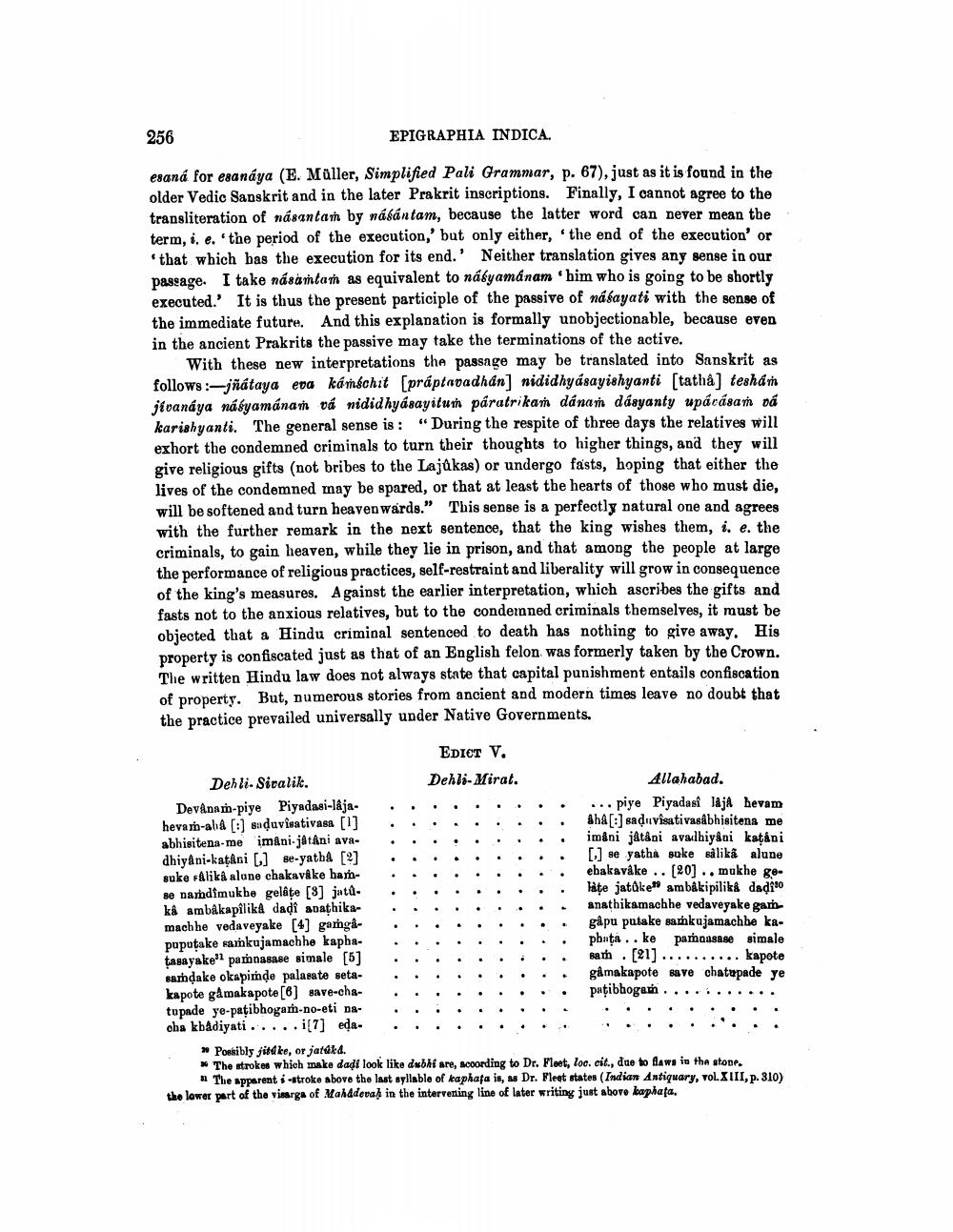________________
256
EPIGRAPHIA INDICA.
esand for esanáya (E. Müller, Simplified Pali Grammar, p. 67), just as it is found in the older Vedic Sanskrit and in the later Prakrit inscriptions. Finally, I cannot agree to the transliteration of násantan by násántam, because the latter word can never mean the term. ie. the period of the execution,' but only either, the end of the execution' or
that which has the execution for its end.' Neither translation gives any sense in our passage. I take násamtath as equivalent to nábyamánam him who is going to be shortly executed.' It is thus the present participle of the passive of ná ayati with the sense of the immediate future. And this explanation is formally unobjectionable, because even in the ancient Prakrits the passive may take the terminations of the active.
With these new interpretations the passage may be translated into Sanskrit as follows:- jñataya eva káméchit (práptavadhan] nididhyásayishyanti (tatha] teshdi jivanäya nábyamánan vá nidid hydsayitum páratrikam dánar dásyanty upávásam na karishyanti. The general sense is : "During the respite of three days the relatives will exhort the condemned criminals to turn their thoughts to higher things, and they will give religious gifts (not bribes to the Lajůkas) or undergo fasts, hoping that either the lives of the condemned may be spared, or that at least the hearts of those who must die, will be softened and turn heavenwards." This sense is a perfectly natural one and agrees with the further remark in the next sentence, that the king wishes them, i. e. the criminals, to gain heaven, while they lie in prison, and that among the people at large the performance of religious practices, self-restraint and liberality will grow in consequence of the king's measures. Against the earlier interpretation, which ascribes the gifts and fasts not to the anxious relatives, but to the condernned criminals themselves, it must be objected that a Hindu criminal sentenced to death has nothing to give away. His property is confiscated just as that of an English felon was formerly taken by the Crown. The written Hindu law does not always state that capital punishment entails confiscation of property. But, numerous stories from ancient and modern times leave no doubt that the practice prevailed universally under Native Governments.
EDICT V. Dehli-Sivalik. Dehlo-Mirat.
Allahabad. Devanam-piye Piyadasi-laja
... piye Piyadasi JajA hevam hevam-ab& (o saduvisativasa [1] . .
.. Sha:] saduvisativasábhisitena me abhisitena-me imani.jtani ava- . . . . . . . . . imini jatani avadhiyani katáni dhiyani-kațâni ] se-yath (2)
[:] se yatha suke sålika alune suke Alika alone chakavake ham
ebakaväke.. [20] .. mukhe gese namdimukbe gelâţe [] jatů.
låte jatûke ambâkipilika dadiso ká ambákapilika daļi apathika
anathikamachhe vedaveyake gam machhe vedaveyake (4) gamgå
gåpu putake sankajamachbe kapopotake ramkujamachhe kapha
phata .. ke pamoasase simale tasayake pamnasase simale [5]
sam. [21] .......... kapote sardake okapimde palasate seta
gâmakapote save chatupade ye kapote gåmakapote [6] save-cha
. . . patibhogam .... ...... tupade ye-patibhogarn-no-eti nacha kbadiyati .....i[7] eda- . . . . . . . . .
» Possibly jitike, or jatkd. # The strokes which make dadi look like dubhí are, according to Dr. Fleet, loc. cit., due to flaws in the stone.
* The apparent i-stroke above the last syllable of kaphata is, as Dr. Flest states (Indian Antiquary, vol. XIII, p.310) the lower part of the visarga of Mahadevah in the intervening line of later writing just above kaphata.




